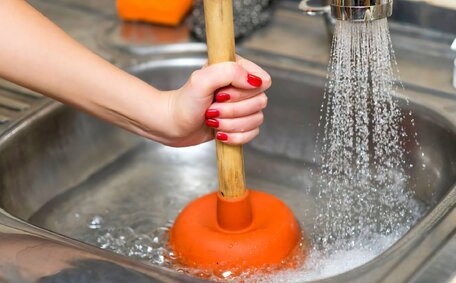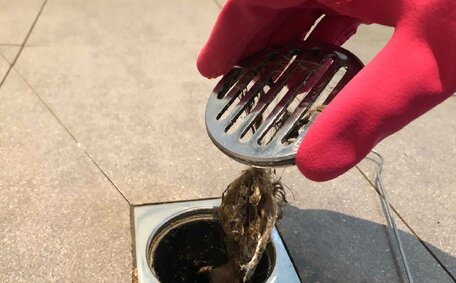How Plumbing Layout Impacts Drainage Efficiency
The layout of your plumbing system plays a crucial role in preventing blocked drains. Ensuring your plumbing system has the correct slope promotes efficient wastewater flow, preventing stagnation in the main sewage conduits. A recommended 2% incline for your main sewer drain ensures optimal drainage without overly rapid flow rates.
Incorporating vent pipes can protect your sewer drains within your sewer system, vital for maintaining proper water pressure and preventing issues that could affect your system’s functionality. Vent pipes admit air into the pipes, thus balancing the pressure and ensuring continuous water flow. Lack of proper venting can lead to water syphoning, risking damage to your plumbing system.
Engaging a licensed plumber to design your drainage system can mitigate problems such as blocked drains, which often arise from incorrect pipe slopes. With their expertise, plumbers create layouts limiting chances of stagnant water accumulation, leveraging methods like jetting to proactively clear any minor buildups, saving time and money before significant blockages occur.
Identifying Blocked Drains: Signs and Symptoms
- Slow draining water - Slow water flow in sinks and toilets can indicate a potential clog in your plumbing.
- Gurgling noises - Draining water bubbles back up the pipes due to obstacles causing blockage, leading to loud gurgles.
- Unpleasant smells - Rotting debris inside your drains can lead to common sulphurous odours in your home.
- Water backup - Accumulations that can cause blockage and damage may lead to water backing up in your tub shower, and toilets, fostering the potential for room flooding.
Unchecked clogged drains can pose severe risks, including raw sewage accumulation and increased contamination hazards. Homeowners should regularly evaluate the functionality of their plumbing today by monitoring sink/tub emptying rates, heeding gurgles, noticing odours, and surveilling water backing down your drains.
To address possible plumbing issues, If you recognise signs of a blocked drain, please call us promptly to address the issue and prevent extensive damage. Regular maintenance checks by a plumber can proactively clear obstructions, including tree roots, to prevent them from developing into major blockages.
Causes of Drain Blockages
Several common factors cause blockages, specifically in the main drain, including:
- Accumulation of hair, soap and hair soap residue, and food waste - These materials naturally progress through your pipelines and can narrow passages, potentially leading to blocked sewer lines over time. Industry reports indicate that clogs from hair, soap, and other materials seeping into your pipe are the primary culprits in blockages.
- Fats and oils - Once cooled, cooking fats and oils can solidify on pipe walls, leading to debris buildup over time.
- Tree roots intrusions - Invasive tree roots questing for moisture can surround and invade drains, obstructing the flow around your drainage system.
- Older pipes - Deteriorating iron or crumbling clay pipes present weaknesses where detritus can gather and create blockages.
Strategically planting trees away from pipes, properly discarding cooking oil, using sink strainers, and routine drain maintenance all prevent the risk of stagnant water due to blockages. Still, a blockage your pipes may face inevitably requires a professional plumber’s high-pressure hydrojetting, root cutting, or electric eel services to restore drainage.
Preventing Future Blockages
Several proactive steps are available that you can do prevent recurrent drain blockages:
- Use sink strainers - Sink strainers trap hair, soap particles, food scraps, and foreign objects, helping to prevent blocked pipes.
- Restricting garbage disposal use helps prevent waste accumulation and reduces blockage risks.
- Regular drain cleaning and clean out of the sewer lines - Annual hydrojetting or using a snake auger can dislodge minor buildup in drain pipes before they develop into significant clogs.
- Avoid harsh chemicals - Caustic cleaners can also corrode pipes, enabling future debris snags.
Cultivating habits such as regularly cleaning your washing machine drain is key in preventing blockages.
- Properly disposing of fats and not pouring oil down - Solidified grease does more than adhere to pipe walls, as debris can become ensnared, contributing to clogs.
- Installing hair catchers - Strainers trap hair, soap and hair soap scum, and other materials near sinks and tubs, preventing them from entering drainage.
- Only flush toilet paper - Avoiding the urge to flush wet wipes, which can block your toilet and are notorious for causing blockages, can circumvent the swelling and fragmenting that lead to obstructions.
Contact our team to develop a comprehensive maintenance plan for your property, ensuring efficient wastewater flow and early detection of signs of drain blockages.
DIY Methods to Clear Simple Blockages
Homeowners can employ simple DIY methods for minor issues before seeking professional plumbing services:
- For quick fixes, use a plunger over the kitchen sink drain and pump firmly to free clogs.
- Try a baking soda/vinegar mixture - Pour 1⁄2 cup baking soda down the drain followed by 1 cup vinegar. Let fizz for 5-10 minutes then rinse with hot water.
- Boiling water down - Boil a pot and carefully pour the water down your drain (not suitable for PVC pipes); the heat can help break down some types of blockages. The hot water can help dissolve what a stubborn clog can consist of, like grease.
These methods are often effective in addressing partial clogs caused by hair, grease, and light debris. However, if repeated attempts fail to improve drainage, it is likely that the blockage requires professional hydrojetting or drain snaking services.
Signs like overflowing drains, foul odours, or multiple affected drains suggest it’s time for our team to tackle your drain issues. Our team can take the high-powered tools and cameras to clear difficult clogs and provide long-term preventative maintenance.
Professional Drain Clearing Services
For extensive or recurring drain blockages, don’t hesitate to call us for professional hydrojetting with a powerful water jetter projecting streams from a drain snake to scour pipe walls. Any debris is then captured in specialised equipment.
We use specialised cameras for drain inspections to precisely locate obstructions within pipes. From this information, related to your sewer drain pipe, we can do tailored solutions.
Contact our team on 1300 349 338 or [email protected] for an appointment if you have signs of major blockage. Our licensed plumbers use high-pressure water tools to examine drainage systems and effectively clear the toughest clogs.
The Importance of Regular Drain Inspections
Regular inspections are crucial to prevent future problems by maintaining optimal wastewater flow and preventing minor issues from escalating into severe blockages or causing backups. Strathfield Plumbing’s licenced technicians have the high-tech equipment to thoroughly examine your drainage system, accurately identify any problem areas, and address them promptly.
Annual CCTV inspections can catch and resolve small clogs before they worsen. Small tree root intrusions or debris accumulate unnoticed, eventually causing significant blockages. Having a detailed pipe assessment annually uncovers these threats before necessitating extensive repairs, which may include pipe relining.
Our experts manage blockage causes by upholding correct pipe gradients, integrity, and venting for efficient drainage. Investing in proactive maintenance is essential to prevent expensive emergency repairs and water damage later.
As Strathfield’s reliable plumbing provider, we’re equipped to support your property’s plumbing needs all year. Our in-depth understanding of local drainage challenges allows us to fine-tune systems for enduring functionality. Call us at 1300 349 338 for information on integrating annual drain checkups into your maintenance routine.





